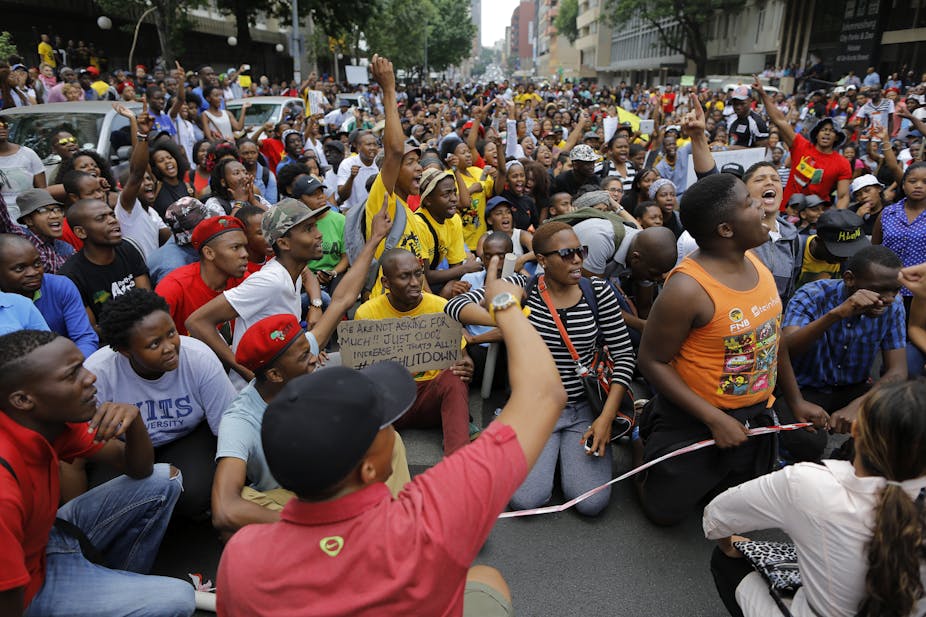The South African Young Academy of Science (SAYAS) is the voice of young scientists. Science and Technology editor Edwin Naidu put a few questions to SAYAS members Jo Vearey, Sershen Naidoo, Tolullah Oni and Voster Muchenje about the widespread student protests in the country.
Why is the current funding model insufficient for tertiary institutions?
Higher education, along with other critical needs, including health care, secure tenure and decent work, is central to South Africa’s social and economic development. Equitable access to higher learning is critical to address historical injustice and exclusion.
The Constitution says everyone has a right to education, including higher education. The state should take reasonable steps to make it available and accessible.
South Africa’s position as one of the most consistently unequal countries globally in terms of income means that tuition costs further drive inequity in higher education.
The twin challenges of quality and access have been particularly difficult to address due to the sector’s transformation. This has demanded an increase in provision and institutional mergers, requiring considerable financial investment.
Universities face the consequences of struggling state-provided basic education in South Africa. This leads to a need for extra assistance for unprepared students. Universities and students receive insufficient funding from the state.
Access to higher education is neither fair nor equitable. The Department of Higher Education and Training recognises this, calling for increased funding for higher education in 2014.
The National Student Financial Aid Scheme was set up to support poor students. But it faces many challenges. These include insufficient funding and problematic administrative systems. The scheme provides funding on the basis of what each university charges per student: low-fee-charging universities, mostly historically black universities, receive lower funding per student.
Currently, students with access to finances for fees and other costs, such as accommodation, food and transport, are able to study. But the system fails to address historical injustices related to those who are unable to access or benefit from the system. A large population of students “too rich for student aid but too poor to pay fees” remain excluded. They start but do not finish their studies. Or they complete their studies but end up owing fees. As a result, their results are withheld.
Universities are reliant on academic staff raising funds to support students and to undertake research. They also have to finance temporary academic positions. Such funding models are unsustainable.
Additional challenges in higher education, particularly in terms of employment and associated inequities, is another factor driving the protests. South African university campuses operate largely on the back of outsourced workers who face multiple injustices associated with a lack of equitable pay and benefits.
Administrative staff and academics with precarious, temporary employment positions do not get the same benefits as permanent academic staff. This must be addressed to ensure that all staff receive the same employment benefits as permanent academic employees, including tuition fees exemption for children.
What must be done to address the problem in the short, medium, and long term?
In the short term, there must be respectful dialogue between students, university management and the department. These efforts must be linked to immediate action on university campuses to allow for peaceful protest that does not make criminals of students. Violence from protesting and non-protesting students, staff, police and private security must be condemned. Peaceful protests should be the norm.
New funding models that will change the status quo are urgently required and must address issues around equitable access. The dropout rate because of insufficient funds must also be tackled. Innovative funding models should build in an understanding of the country’s development challenges. It must include increasing the number of students graduating with the qualifications required to address these challenges. Tertiary education must move towards a sustainable publicly funded model.
But improved funding schemes to ensure equitable access to higher education should not come at the cost of reduced capacity for higher education provision in South Africa. The total funding available should be increased.
In what areas does SAYAS see a pressing need for new data/studies on the funding challenge?
The “business-as-usual” approach should be replaced by innovative options that explore turning universities into public institutions: those that are funded fully from the public purse.
A good example of innovation that reflects a successful shift in funding policy took place in Germany in 2014 when higher education was made free. This requires research and analysis of the current higher education budget. Additional funding sources must be pursued – for example, a national wealth tax whereby taxes are levied on personal income.
Higher education can benefit if this becomes a reality. The most recent example of a wealth tax came from French economist Thomas Piketty, who proposed a 0% tax for those with less than R1 million in wealth, a 0.1% tax for those with between R1 million and R10 million, and 0.5% for those with more than R10 million.
Other options include adopting a sliding scale of tuition fees linked to the capacity of individual students to pay. It should move beyond the current income caps prescribed by the student financial aid scheme. But the challenges relate to the ways in which the capacity to pay would be administered, and concerns on how a means test could impact on a student’s experience in higher education.
As young scientists, what is your concern about the current events?
We support efforts aimed at improving the funding of higher education in South Africa and students should continue to be supported through bursaries, fellowships and research grants. But these funds are insufficient and the department must urgently deal with the funding crisis: increased funding should be made available to tertiary institutions and students.
We encourage individuals to support the call from academics, who stand in solidarity with students in their struggle.
While based on a statement issued on October 21, the authors’ responses do not necessarily reflect the views of all SAYAS members. The authors accept responsibility for the content.

